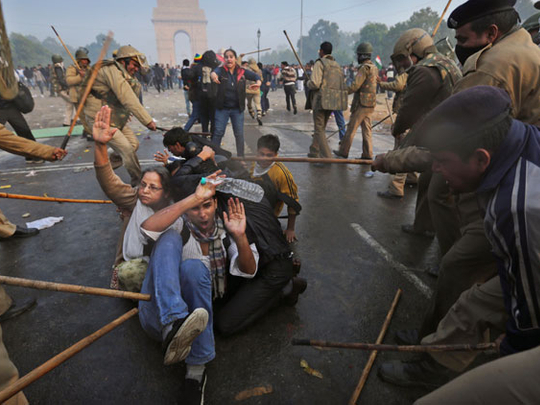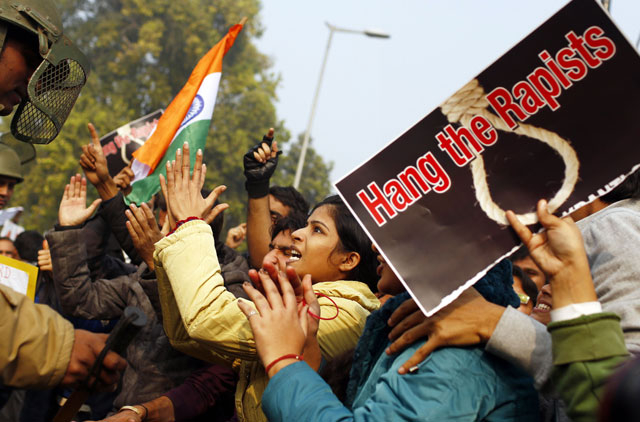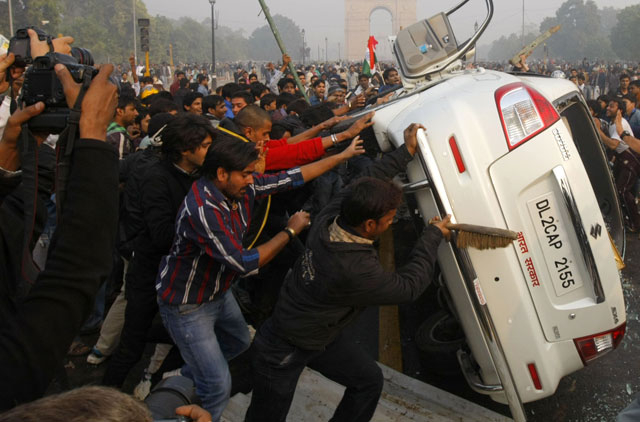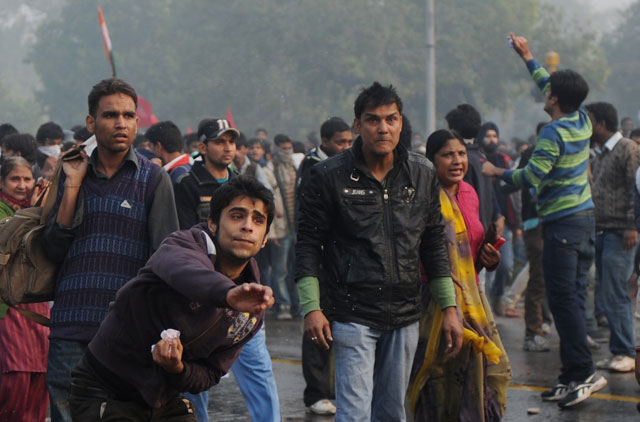
New Delhi: The heart of the Indian capital turned into a battle zone on Sunday as thousands massed to denounce the brutal gang-rape of a young woman, with clashes between police and protesters leaving many injured.
Outnumbered police and paramilitary personnel fired umpteen tear gas shells and repeatedly used batons to break up emotionally charged crowds screaming “We want justice!” and hurling stones and water bottles.
By early evening, three huge bonfires had been lit near India Gate, a World War I monument whose lawns have been besieged by thousands since a 23-year-old was raped in a moving bus, leaving her battling for life.
The more frenzied ones uprooted wooden barricades erected for the January 26 Republic Day crowd control and set them on fire.
Witnesses said several people, including security personnel, were injured.
But even as a section of the vast crowd indulged in violence, breaking police barricades and overturning a handful of vehicles, the mass of young men and women remained peaceful.
Many of them held hand-written posters and waved Indian flags. Some gave fiery speeches.
Unlike Saturday’s equally massive protests, many middle-aged also poured in on Sunday, urging the government to amend laws so that rapists get heavier punishment.
The violence subsided after some 90 minutes of running battles during which crowds charged at security forces around India Gate and retreated in the face of tear gas and batons.
“We hope these protests wake up the government,” said Rakesh Kumar, a businessman in south Delhi who was at the site with his wife and two young daughters.
The younger protesters were more militant and angry.
Pallavi, a 25-year-old working for a multinational, told IANS: “The government is sleeping... The law against rape must be stronger and should be implemented properly.”
Delhi University student Hemant said the protests would continue “until we are assured that girls are safe in Delhi”.
The foggy and chilly Sunday began on a quiet note at the protest venue, with only a small group who had spent the night present. By early morning, crowds began to pour in, shouting slogans.
The initials slogans, mainly condemning the December 16 rape, later turned anti-police.
Having barricaded all the roads leading to the Rashtrapati Bhavan and government offices close by, security forces sprayed water and fired tear gas at the crowds demanding death to the rapists.
Prohibitory orders banning the assembly of five or more people were clamped in parts of the city centre in a bid to prevent the demonstrators from marching to the presidential palace or Prime Minister’s Office.
The continuing protests over the rape found their echo in the political circles.
Congress president Sonia Gandhi Sunday promised a group of young people that speedy action would be taken against the accused and they would also be charged with attempt to murder.
This was her second meeting with some of the protesters.
A huge crowd had camped out outside her 10 Janpath residence on Saturday night. To the surprise of many, she came out past midnight, sat with them and spoke for some 20 minutes.
The day’s protests also drew political activists. But most appeared to be people with no particular affiliation.
Amid all this, yoga guru Ramdev reached the Jantar Mantar protest site also in the city centre standing atop a bus. Later, many of his supporters made their way to India Gate shouting slogans.
Earlier, police evicted protesters from near India Gate but succeeded only partially.
Many young men and women were grabbed and forcibly led away towards parked buses. But many slipped through.
Delhi Chief Minister Sheila Dikshit appealed for calm but said she did not approve of police action against the young.
Authorities shut eight Delhi Metro stations but that seemed to have no impact on the crowds.
The 23-year-old gang-rape victim, battling for life in a Delhi hospital, has been named “Damini” by thousands of people who are supporting her on the streets and via social networking sites. The name draws inspiration from a Hindi film on a woman’s fight for justice for a rape victim.
Outside Safdarjung Hospital, where the girl is battling for life after her brutal gang-rape by six men in a moving bus in south Delhi December 16, people gathered on Sunday with placards that said “Damini tum sangharsh karo, hum tumhare sath hain” (struggle Damini, we are with you).
Voicing concern over the gang-rape of a woman, the Delhi High Court on Sunday issued directions to additional sessions judges to have daily hearing in cases of sexual assault. Five fast track courts will also come up.
“The administrative committee of the Delhi High Court has resolved to direct additional sessions judges that cases of sexual assault on women will be tried on day-to-day basis from the date of commencement of the trial,” the high court said.
The administrative committee headed by the chief justice has accepted a proposal of the government to establish five special fast track courts for dealing with cases of sexual assault on women and taken steps to establish such courts immediately after the winter vacation, it said.















